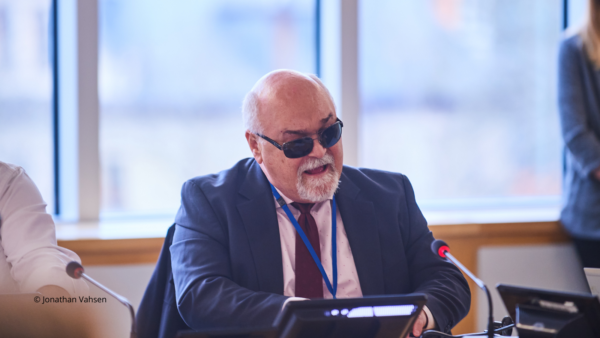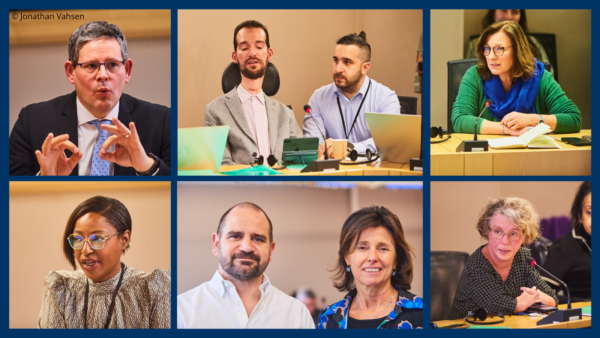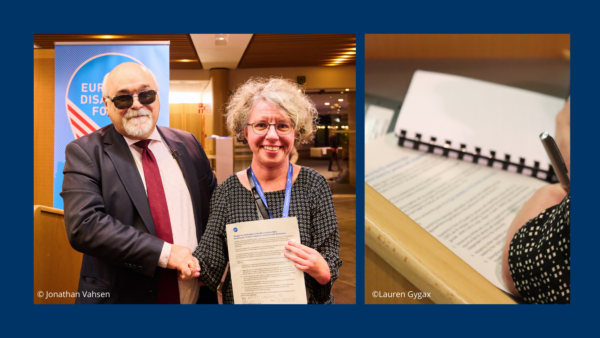On January 31, MEP José Gusmão hosted what could be the concluding bureau meeting of the European Parliament’s Disability Intergroup before the upcoming European Elections in June 2024.
During his opening speech, MEP José Gusmão reflected on the role of the Disability Intergroup in the last term:
There is no doubt this has been an extremely challenging mandate, in which Europeans, and more so persons with disabilities had to cope with unprecedented crisis, such as the global pandemic, another war in Europe, or the cost-of-living crisis. I believe this Disability Intergroup has played a crucial role in raising awareness, promoting and defending the rights of persons with disabilities.
This annual meeting with the Executive Committee members of the European Disability Forum was also an opportunity for Members of the European Parliament to:
- Assess achievements, draw lessons, and define final goals for this legislative term.
- Shape campaigns in preparation for the European Elections, with an emphasis on addressing the upcoming new European Parliament and Commission to prioritise the rights of persons with disabilities on the EU’s political agenda.
The European Disability Movement’s priorities

The Executive Committee of EDF also participated in the meeting to present the main objectives of the European disability movement for the coming months.
EDF’s President Yannis Vardakastanis thanked Members of the Intergroup for their participation in the 5th European Parliament of Persons with Disabilities before reminding them about the upcoming review of the European Union (EU) by the UN Committee on the Rights of Persons with Disabilities.
The EDF Executive Committee also encouraged MEPs to continue the work on crucial policy files that can be concluded in this legislative term and presented the priorities for the European Disability Movement:
- The adoption of an EU-wide European Disability Card will ensure mutual recognition of disability status across EU countries.
- Ending forced sterilisation of women and girls with disabilities in all Members States.
- Tackling discriminatory loopholes of the current legal framework of the package on passengers’ rights that the Commission released late last year.
- The creation of a European Agency for Accessibility to build the capacity of the EU, national and local public administration, and industry across countries.
- Amending the European Commission’s proposal on “protection of vulnerable adults” in cross-border situations undermines the CRPD.
- Continue the work on the Employment Package, the Corporate Sustainability Reporting Directive, and the Corporate Due Diligence Directive to achieve a change of mindset among companies and employers.
The Disability Intergroup’s priorities

During the meeting, MEPs discussed the priorities before the end of the 9th parliamentary term.
MEP Monica Semedo spoke about the need to ensure a strong European Disability Card.
MEP José Gusmão talked about how the negotiations on the European Disability Card were in full swing and how the European Parliament and the disability movement need to advocate for an ambitious Disability Card.
Pat Clarke, Vice President of the EDF, mentioned the usefulness of the EP Disability Rights Week.
Nadia Hadad, EDF executive Committee member, spoke about the need for strong legislation to combat violence against women and gender-based violence and how it should protect women and girls with disabilities.
MEP Katrin Langensiepen mentioned the need to work on the directive to end violence against women and to advocate for a ban on forced sterilisation.
MEP Stelios Kympouropoulos spoke about the need for the Intergroup to focus on persons with invisible disabilities and to directly support representatives of organisations of persons with disabilities.
MEP Mónica Silvana González focused on the need to ensure that persons with disabilities run as candidates and that both authorities and parties support them. She also mentioned the need to gather and monitor data on the participation of persons with disabilities in elections.
MEP Ádám Kósa raised the need to work more together and coordinate initiatives. He also supported MEP Gonzalez’s point in ensuring that persons with disabilities need to be represented in the European Parliament and highlighted that MEPs with disabilities represent all their constituents.
MEP Stelios Kympouropoulos added to this point, stating there are only 7 persons with disabilities as MEPs.
EDF’s President Yannis Vardakastanis spoke about the issue of persons with disabilities being able to be part of political parties. He presented the efforts of the disability movement towards the European elections.
He underlined how the European Union needs to advance disability rights, with a specific focus on creating strong structures in the Commission and other institutions. He also presented the 3 pillars of EDF’s EU elections campaign:
- Promote the proposals of the EDF Manifesto for the 2024 European elections.
- Institutions, political parties and candidates incorporate accessibility in their campaigns.
- Increase disability representation in the European Parliament: have more candidates with disabilities and provide them with proper support.
MEP José Gusmão concluded the meeting with a word of encouragement:
We know we are now at the countdown before the elections, and there are still too many barriers to full inclusion, non-discrimination, and equal opportunities for persons with disabilities. Let’s make the best out of the remaining weeks, and let’s work across political parties, as we have always done in this Intergroup, to keep promoting the rights of 100 million persons with disabilities during and after the elections.
MEPs calling for the re-establishment of the Intergroup

The Disability Intergroup meeting was followed by the annual Intergroup New Year’s Reception. It was the occasion for representatives and officials from the European Institutions to discuss with Civil Society Organisations and other relevant stakeholders working on disability-related issues. After a speech from the host – MEP Katrin Langensiepen, – the European Disability Forum launched its pledge ” Building an inclusive future for persons with disabilities”. After that, several Members of the Intergroup, including MEP Stelios Kympouropoulos and MEP Mónica Silvana González, signed it.
By signing the pledge, MEPs committed to re-join the Disability Intergroup of the European Parliament, in case they will stay as MEPs during the next mandate, and to work together with the disability movement to support the revision of the EU Disability Strategy and to achieve:
- Promoting the meaningful participation of persons with disabilities and their representative organisations in the political and public life of the EU
- Realising a Union of Equality for persons with disabilities. A Union with the UN CRPD as its compass and combating intersectional forms of discrimination based on gender, racial or ethnic origin, religion or belief, disability, age or sexual orientation.
- Introducing policies and a new EU budget aiming at supporting inclusion and equal opportunities for persons with disabilities in all areas of life, as well as their independent living in the community.
- Adopting further legislation ensuring accessibility for persons with disabilities and realising their rights of free movement in the EU.
- Strengthening the protection of persons with disabilities in the EU and beyond, including by supporting the EU in becoming a stronger promoter of the implementation of the CRPD worldwide.